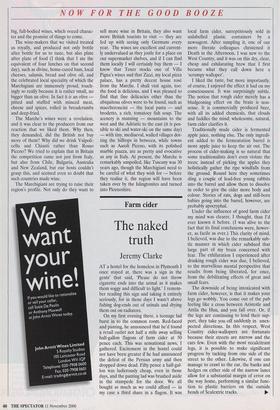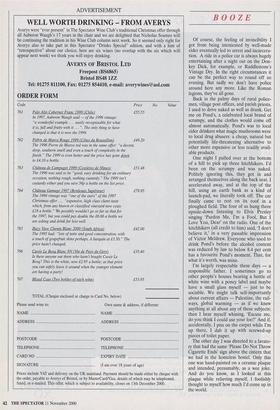Farm cider
The naked truth
Jeremy Clarke
AT a hostel for the homeless in Plymouth I once stayed at, there was a sign in the gents' that said, 'Please do not throw cigarette ends into the urinal as it makes them soggy and difficult to light.' I remem- ber reading this sign and taking it entirely seriously, for in those days I wasn't above fishing dog-ends out of urinals and drying them out on radiators.
On my first evening there, a teenage lad burst in to the common room. Red-faced and panting, he announced that he'd found a retail outlet not half a mile away selling half-gallon flagons of farm cider at 50 pence each. This was sensational news, I gathered. Excitement in the hostel could not have been greater if he had announced the defeat of the Persian army and then dropped down dead. Fifty pence a half-gal- lon was ludicrously cheap, even in those days, and the panting lad was brushed aside in the stampede for the door. We all bought as much as we could afford — in my case a third share in a flagon. It was local farm cider, surreptitiously sold in unlabelled plastic containers by a newsagent. After sampling it, one of our more literate colleagues christened it Death in the Afternoon. I was new to the West Country, and it was on this dry, clear, cheap and exhilarating brew that I first became what they call down here a `scrumpy walloper'.
I liked the taste, but more importantly, of course, I enjoyed the effect it had on my consciousness. It was surprisingly subtle. The notion that rough cider merely has a bludgeoning effect on the brain is non- sense. It is commercially produced beer, with all its added chemicals, that clouds and fuddles the mind; wholesome, natural, farm cider clarifies it.
Traditionally made cider is fermented apple juice, nothing else. The only ingredi- ent added to the fermentation barrel is more apple juice to keep the air out. The process of cider-making is so natural that some traditionalists don't even violate the trees; instead of picking the apples they holistically gather the ripe windfalls from the ground. Round here they sometimes sling a couple of lead-free young rabbits into the barrel and allow them to dissolve in order to give the cider more body and colour. Stories of rats, dogs and still-born babies going into the barrel, however, are probably apocryphal.
Under the influence of good farm cider my mind was clearer, I thought, than I'd ever known it before. (I was alive to the fact that its final conclusions were, howev- er, as facile as ever.) This clarity of mind, I believed, was due to the remarkably sub- tle manner in which cider subdued that large part of my brain concerned with fear. The exhilaration I experienced after drinking rough cider was due, I believed, to the marvellous mental perspective that results from being liberated, for once, from the debilitating effects of great and small fears.
The downside of being intoxicated with farm cider, however, is that it makes your legs go wobbly. You come out of the pub feeling like a cross between Aristotle and Attila the Hun, and you fall over. Or, if the legs are continuing to lend their sup- port, they take you off suddenly in unex- pected directions. In this respect, West Country cider-wallopers are fortunate because their streets are narrow and the cars few. Even with the most recalcitrant legs, it is possible to make significant progress by tacking from one side of the street to the other. Likewise, if one can manage to crawl to the car, the banks and hedges on either side of the narrow lanes allow for a substantial margin of error on the way home, performing a similar func- tion to plastic barriers on the outside bends of Scalextric tracks.
BOOZE
Of course, the feeling of invincibility I got from being intoxicated by well-made cider eventually led to arrest and incarcera- tion. A ride in a police car is always hugely entertaining after a night out on the Don- key Dick, for example, or Raddlestone's Vintage thy. In the right circumstances it can be the perfect way to round off an evening. But sadly we don't have police around here any more. Like the Roman legions, they've all gone.
Back in the palmy days of rural police- men, village post offices, and parish priests, I used to drive naked as well as drunk. Get me on Pond's, a celebrated local brand of scrumpy, and the clothes would come off almost automatically. Pond's was to local cider drinkers what magic mushrooms were to local drug abusers: a cheap, natural but potentially life-threatening alternative to other more expensive or less readily avail- able products.
One night I pulled over at the bottom of a hill to pick up three hitchhikers. I'd been on the scrumpy and was naked. Politely ignoring this, they got in and arranged themselves along the back seat. I accelerated away, and at the top of the hill, using an earth bank as a kind of launch-pad, we literally took off. The car finally came to rest on its roof in a ploughed field. The four of us hung there upside-down listening to Elvis Presley singing 'Pardon Me, I'm a Fool, But I Love You, Dear' on the radio. One of the hitchhikers (all credit to him) said, 'I don't believe it,' in a very passable impression of Victor Meldrew. Everyone who used to drink Pond's before the alcohol content was reduced by law to below 8.4 per cent has a favourite Pond's moment. That, for what it's worth, was mine.
I'm largely respectable these days — a responsible father. I sometimes go to other people's houses bearing a bottle of white wine with a poncy label and maybe have a small glass myself — just to be sociable. We might talk self-importantly about current affairs — Palestine, the rail- ways, global warming — as if we knew anything at all about any of these subjects; then I hear myself whining, 'Excuse me, do you think I could use your loo?' And if, accidentally, I piss on the carpet while I'm up there, I dab it up with screwed-up pieces of toilet paper.
The other day I was directed to a lavato- ry that had the same 'Please Do Not Throw Cigarette Ends' sign above the cistern that we had in the homeless hostel. Only this one was hand-painted on a ceramic plaque and intended, presumably, as a wee joke. And do you know, as I looked at this plaque while relieving myself, I foolishly thought to myself how much I'd come up in the world.



























































































 Previous page
Previous page